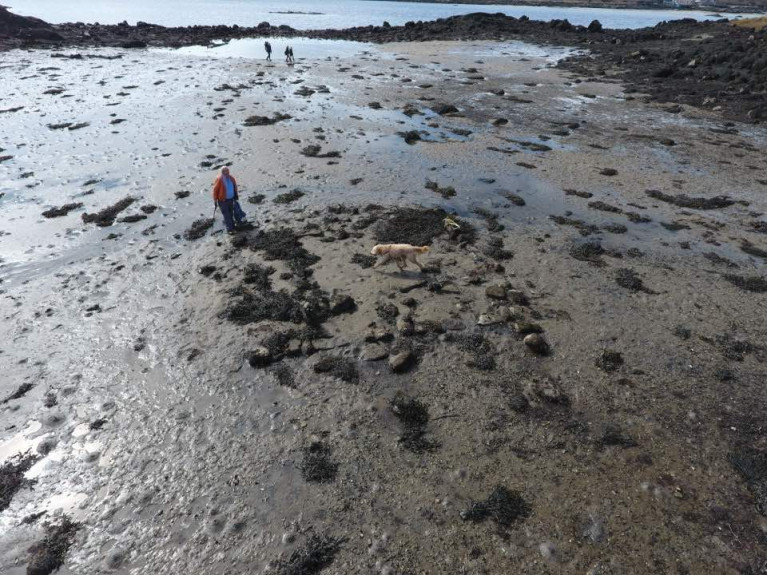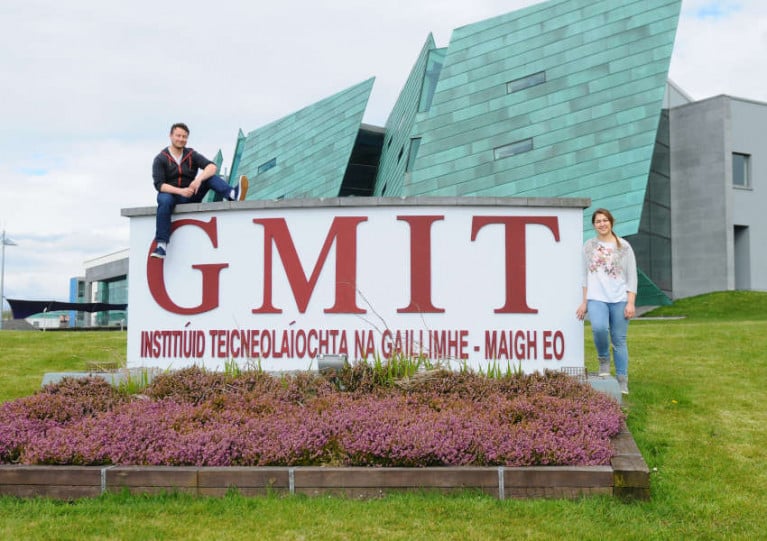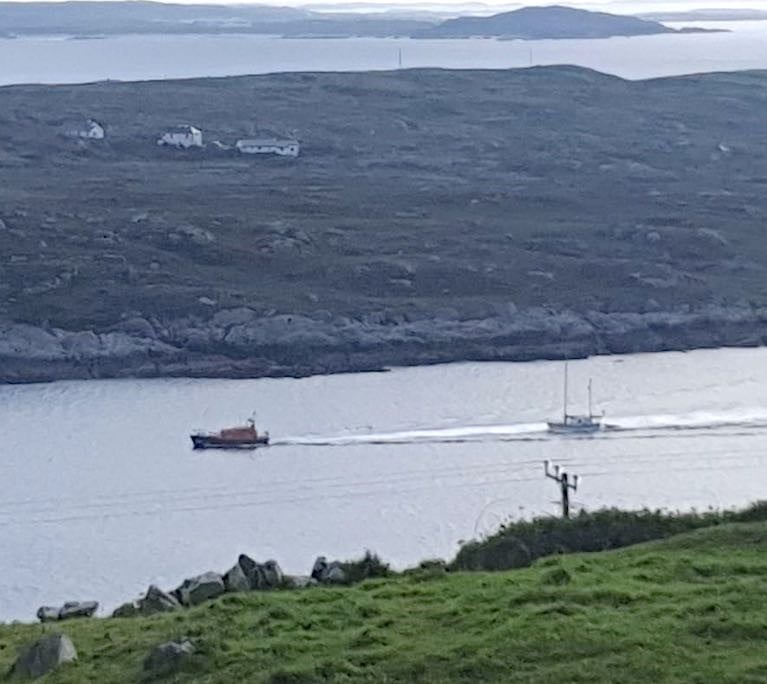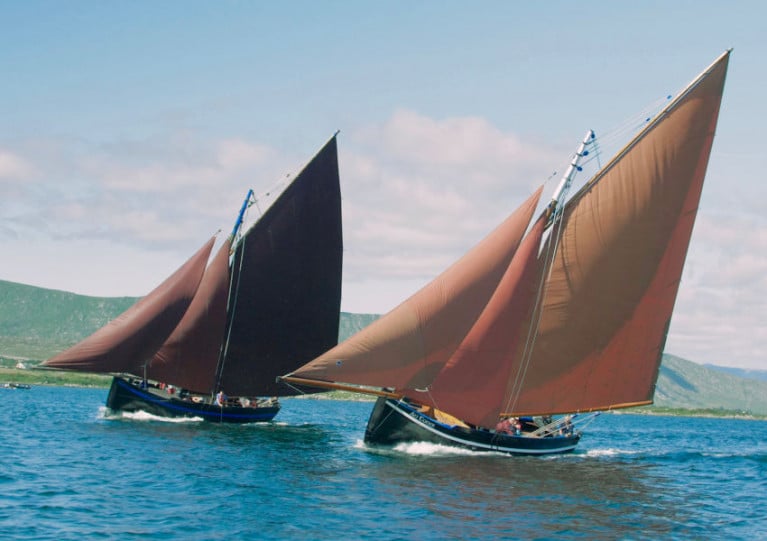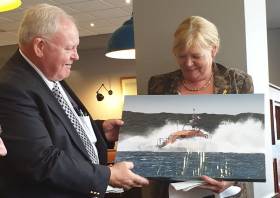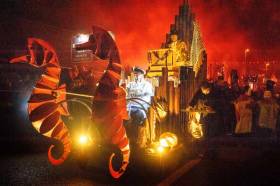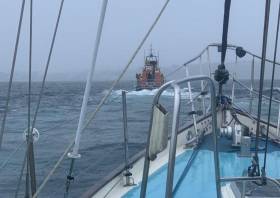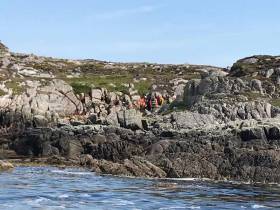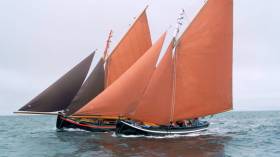Displaying items by tag: Connemara
Further Evidence of Sea Level Rise Along the Atlantic Coast Uncovered on North Connemara Inter-Tidal Zone
Discovery of the remains of a “drowned” prehistoric house in north Connemara may be further evidence of sea-level rise along the Atlantic coast in the last millennium.
As The Sunday Times reports today, parts of a small prehistoric dwelling covered by sea except at low spring tide have been identified by archaeologist Michael Gibbons and engineer Shane Joyce on the coast south-west of Clifden, Co Galway.
The site is in a sheltered “lagoon-like setting” on the tip of the Faul peninsula, at the junction of Clifden and Ardbear bays.
Gibbons said that the structure is similar in size to early Neolithic houses, and it is protected from tidal surges by Oileán Gearr or Islandagar, a small island on its western side.
Gibbons said it was further evidence of a “drowned prehistoric landscape”, which has been researched and dated by NUI Galway palaeoecologists Prof Michael O’Connell and Dr Karen Molloy.
O’Connell and Molloy have estimated that sea levels rose by as much as four metres on the Atlantic coast in later prehistory - as in 1,000 years ago – with Galway Bay being younger than originally estimated.
Prof O’Connell said that it was “quite reasonable” to suggest the structure identified by Gibbons and Joyce may be early Neolithic, given that sea level rise occurred in the late Neolithic period.
O’Connell and Molloy’s work focused on tree stumps, believed to be bog pine, which have been exposed at low tide by storms dating back to 2010, along with pollen analysis of coastal peat deposits.
Gibbons said that a shell midden dating from 4,000 BC on the Errislannan peninsula, just south-west of the Faul location, was also evidence of Neolithic settlement by early farmers.
Read The Sunday Times report here
SmartBay Ireland Announces New Scholarship For Research With GMIT
SmartBay Ireland have collaborated with the Galway-Mayo Institute of Technology (GMIT) to launch a new scholarship scheme for a candidate from the Connemara Gaeltacht to begin a Master’s research programme.
Commencing in November 2020, the new programme aims to develop post-primary educational resources in the field of marine renewable energy.
And the scholarship, which is now open for applications, is designed to fund and support a candidate in the Connemara Gaeltacht Region — while also driving awareness around ocean literacy, marine renewable energy, and sustainability through education in local schools.
The successful candidate will receive full funding support to the value of €44,500 over the duration of the 24-month project, which will focus on the preparation and delivery of educational resources at post-primary level, in both English and Irish.
SmartBay Ireland general manager John Breslin said: “This scholarship is an excellent opportunity for the successful candidate not only to advance in their career, but to be at the forefront of developing educational resources and make a positive and lasting impact on the post primary curriculum.”
Applications are open until noon next Wednesday 16 September for candidates with experience as a post-primary educator, preferably in the field of science, with demonstrable proficiency and fluency in the Irish language.
“This is a very exciting opportunity which would suit an enthusiastic candidate with a passion for education, the marine and sustainability,” said Dr Róisín Nash, a lecturer at GMIT.
“At a time when research and management of essential marine resources are key features of a sustainable future, this is a unique project with lots of opportunities for the candidate to be creative and influential in incorporating marine and renewable energy into the classroom.”
The SmartBay Ireland Postgraduate Research Scholarship is funded by the Galway-Mayo Institute of Technology, the Marine Institute, the Sustainable Energy Authority of Ireland and Údarás na Gaeltachta.
Full details on the postgraduate research scholarship and application procedure are available from GMIT website HERE.
Clifden RNLI has rescued a sailor who got into difficulty on a 36ft yacht this afternoon. The volunteer lifeboat crew were requested to launch at 3.20 pm by the Irish Coast Guard following a report that a yacht was in difficulty somewhere between Cleggan and Inishbofin Island.
As communication with the casualty was poor initially, a decision was made to launch Clifden RNLI’s inshore lifeboat in addition to the station’s all-weather lifeboat.
Weather conditions at the time were fair with a Force 3 northerly wind and a slight sea.
The inshore lifeboat helmed by Daniel Whelan arrived on scene first, some 10 miles from Clifden. The lifeboat crew assessed the situation and checked that the one man onboard was safe and well. A crew member then transferred onto the yacht to set up a tow.
 The yacht under tow by Clifden RNLI
The yacht under tow by Clifden RNLI
On arrival of the all-weather lifeboat under Coxswain John Mullen, the tow was passed from the inshore lifeboat to the all-weather lifeboat. The all-weather lifeboat then towed the yacht safely back to shore with the Atlantic 85 lifeboat alongside.
Speaking following the call out, Clifden RNLI Coxswain John Mullen said: ‘We would like to commend the sailor for raising the alarm when he got into difficulty, that is always the right thing to do, and we would like to wish him a safe onward journey.
‘As the summer continues and we enjoy some good weather, we would remind everyone regardless of their activity at sea, to always respect the water. Always wear a lifejacket, always have a means for calling and signalling for help and ensure everyone onboard knows how to use it. Always check the weather forecast and tide times before heading out and make sure someone on the shore knows where you are going and when you are due back. Should you get into difficulty or see someone else in trouble, dial 999 or 112 and ask for the Coast Guard.’
On the western edge of Europe lies a unique culture that depended and fought with the Atlantic Ocean for thousands of years.
It is the native sailboat, the Galway Hooker, that sustained this poorest of communities, and the new generation of these same families of sailors still sail the coast of Connemara, now racing to be champions.
TG4’s documentary Bádóiri, now in its second series, follows the historic boats as they awaken from the long Connemara winter, only to find new contenders aboard for this season’s Galway Hooker Racing League regattas.
The preparations have started in earnest, and the show will keep up with the sailors as they race each other in the first of the summer’s races.
In series one we saw the family owned boats battle one another for the coveted prize of All-Ireland champions. In this new series, we introduce a new boat and a new family to the fleet.
Young and eager to impress, this new crew from The Truelight become a racing force to be reckoned as all the crews push themselves and their boats to their limit.
This second series also delves deeper into sailing families lives and histories.
An illness to one of the skippers bring the boatmen together where they share their personal stories as well as their hopes and fears from their sailing culture. Towards the end of the series, the racing and rivalry becomes more intense and the waters become treacherous.
Producer and director Donncha Mac Con Iomaire says: “There are few societies in the world where a 200-year-old boat is the epicentre of the same family for two centuries.
“The maritime community of Connemara never underestimates the Atlantic, and the unity of their families cannot afford to succumb to failure at sea. This ancient world that works hard and plays hard is what is still most genuine culture of Ireland.”
Bádóiri returns tonight, Thursday 5 March, at 8pm on TG4.
Tributes Paid To Lifeboat Volunteers In Connemara
Members of the Connemara/Clifden RNLI Lifeboats Fundraising Branch gathered at the Station House Hotel in Clifden recently to acknowledge the contributions and retirements of some longstanding members.
Area fundraising manager Tony Hiney, who is himself set to retire this year, joined with Clifden RNLI fundraising manager AnnMarie Bennett and chairman Pearse Hyland to present the awards.
Geraldine Heanue of Letterfrack received an award in recognition of her retirement after more than 20 years service as a fundraising officer.
Stuart Freeman of Ballynahinch was presented with an award for long service on his retirement, having volunteered as an RNLI box collector and fundraiser for over 40 years.
A posthumous award was presented to Ann and Catherine Coyne in recognition of Clifden man Owen Coyne’s longstanding support of the lifeboats during Flag Day and church gate collections.
Margaret Wallace was also recognised for her volunteering for collections and retirement from the fundraising team.
Bernie Davis received an award for excellence in volunteering for her long-running annual participation in the Dublin Women’s Mini Marathon in support of Clifden RNLI.
Although unable to attend on the day, Michael Mullen also received an award for excellence in fundraising for his annual darts competition in memory of his son Mikey Mullen, who was tragically lost at sea.
Mikey’s mother Laurence Inglebach also received an award for excellence for her annual fundraising Clifden Lifeboat 10k Run earlier this year.
‘Without the time and energy of our fundraising volunteers, the crew would simply not be able to carry out the lifesaving work that they do’
Speaking at the gathering, AnnMarie Bennett thanked everyone in attendance for their consistent and long standing support of the lifeboats in Connemara.
“The Clifden RNLI has grown and developed hugely over the years and the generosity and dedication of all our fundraising volunteers is what helps this to happen,” she said.
“Without the time and energy of our fundraising volunteers, the crew would simply not be able to carry out the lifesaving work that they do, and we are all extremely grateful for everything you have done in support of the lifeboats.
“Your generosity and time has saved lives and helped families and our community in so many different ways over the years.”
Conamara Sea Week Parade Tonight at Letterfrack, Galway
Giant “fire sculptures”, a community dinner, jazz lunch and a walk to Omey island are among activities planned for Conamara Sea Week’s programme based in and around the Quaker village of Letterfrack.
Ecologist Gordon D’Arcy is participating in a schools programme, and students from primary to third level have created images for the “After the Light” parade tonight, Wed October 23rd, from 7pm.
The award-winning festival, which has been running since 1984, is focused on the community, with a strong environmental focus.
“Myth, magic and a hint of madness” is promised for the mid-week parade, involving students from five primary schools, local crèches, Youthreach, Galway-Mayo Institute of Technology (GMIT) Letterfrack, the Galway Roscommon Education and Training Board and the Brothers of Charity.
An “active age club” lunch and music at Rosleague Manor takes place on Thursday, October 24th, and that same evening a community dinner in Veldon’s Seafarer will offer food made by award-winning chef Jonathan Keane of the Lodge at Ashford.
Artist Mo West will open a sea week “small works” art exhibition at Connemara National Park on Saturday (Oct 26), and John O’Halloran will lead a walk on Sunday to Omey island, meeting at Claddaghduff church at 10.30am.
The programme, including music of all genres, continues until bank holiday Monday, and further information is available by phoning 085 1154629 or check the website here
Five people were rescued off North Co Antrim yesterday afternoon (Friday 30 August) when their 33ft yacht got into difficulty near Rathlin Island.
Red Bay RNLI’s volunteer crew were requested to launch their all-weather lifeboat 1.20pm following a report that the yacht was struggling to make headway in difficult conditions at sea some five miles south-east of Rathlin.
Two of the crew onboard the yacht — which was on passage to Carrickfergus — were also suffering from seasickness, Red Bay RNLI says.
The lifeboat crew set up a tow and brought the vessel to Ballycastle. Speaking later, Red Bay RNLI press officer Paddy McLaughlin said: “Conditions at sea were challenging this afternoon and the crew made the right decision to call for help.”
Elsewhere, Clifden RNLI in Connemara launched its new all-weather lifeboat for the first time on Thursday afternoon (29 August) to reports of a RIB adrift and in danger in Ballinakill Bay between Letterfrack and Renvyle.
However, it was the D class inshore lifeboat Celia Mary which was first on the scene — where volunteers found two people on a 5.5m RIB with engine failure that was very close to the rocky shore in worsening weather conditions, with a Force 6 wind at the time.
Lifeboat helm Thomas Davis agreed with the two people on board the RIB that the vest course of action was a tow back to shore, which was safely completed.
Davis said: “We were glad to be able to help these people recover their boat today.
“We also wish to remind all water users in Connemara to contact the coastguard or emergency services at the earliest opportunity when things go wrong — we would always rather launch and be stood down than risk other possible outcomes.”
Clifden RNLI Rescue Man Trapped in Shoreline Fall
A man whose leg got trapped on the Connemara shoreline during a rising tide was brought to safety in a multi-agency rescue on Thursday evening writes Lorna Siggins
The incident occurred when a couple were out walking at Slackport on Slyne Head, close to Ballyconneely, according to the RNLI Clifden lifeboat station.
The man fell on the shoreline, trapping his leg badly in some rocks and was unable to free himself. RNLI Clifden station press officer Catherine Pryce says the location was close to the high watermark in a rising spring tide.
The RNLI Clifden lifeboat and Cleggan Coast Guard volunteers, along with the Irish Coast Guard Rescue 118 helicopter from Sligo responded after the couple raised the alarm.
Clifden’s Atlantic 85 inshore lifeboat was launched with Joe Acton at the helm, along with the station’s Mersey class all-weather lifeboat under the command of coxswain James Mullen.
“ The Atlantic 85 was first on the scene and crewman Alan Pryce went ashore to assess the situation and administer first aid. Alan was quickly joined by two more crew members from Clifden’s all-weather boat,” Ms Pryce said.
The man’s injuries were assessed, and he was winched up to safety by the Sligo helicopter crew.
Clifden’s RNLI lifeboat station took delivery of a new all-weather Shannon class lifeboat earlier this week, which will increase the station’s range and capability.
‘This was an urgent and very serious call out and the crew located and assisted the casualty very quickly,” Clifden RNLI operations manager John Brittain said.
“ It has been a very busy week for our station with the arrival of our new Shannon class lifeboat, and the crew once again demonstrated that they are always there to respond when needed, working closely and effectively with our Coast Guard colleagues," Mr Brittain added.
Galway Bay FM reports that An Bord Pleanála has refused planning permission for a development at a Connemara site overseen by Udarás na Gaeltachta.
Plans for the Páirc na Mara facility were previously approved by Galway County Council, but continued to face opposition from local groups concerned that the initial proposals would develop into a full-scale salmon farming facility.
That decision has now been overturned by the national planning authority, according to Galway Bay FM.
Four months ago the Páirc na Mara marine project had welcomed the announcement of €2 million in funding from the Business, Enterprise and Innovation to develop a market-focused marine innovation and development centre at the Cill Chiaráin site.
#OnTV - A new four-part documentary series on the people of Ireland’s west who keep the Galway Hooker sailing tradition alive behind tomorrow night (Thursday 10 January) at 8pm on TG4.
Bádóirí provides an insight into seven Connemara families, part of one of the few indigenous communities of sailors left in Europe, as they compete to be champions of the Galway Hooker Association Racing League.
The first of four episodes screens tomorrow at 8pm and will be available to stream for viewers in Ireland on the TG4 Player.


























